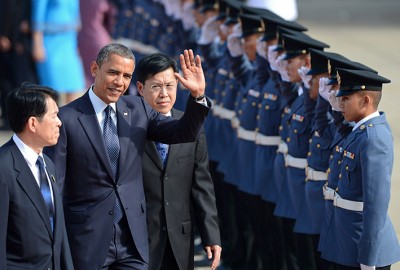U.S. President Barack Obama is underscoring the administration’s “strategic pivot” to Asia with a trip to the Pacific. This column has criticized this pivot and the botched public diplomacy campaign that managed to irritate friends, allies and, of course, China.
The Pentagon attempted to minimize the PR damage renaming the pivot “rebalancing.” But the obvious and potentially fatal flaws in this pivot with its emphasis on military and not diplomatic, economic and political tools remain uncorrected.
Meanwhile, the most dangerous and visible ticking time bombs lie in North Africa, the Middle East, Iran and the Afghan-Pakistani border where conflict is ongoing and could too easily explode.
Tensions in the South and East China seas over territorial claims involving several states are unlikely to escalate to war. While China is increasing its defense spending and its military capability, virtually all of its neighbors aren’t friends or allies and possess (or could possess) counterbalancing forces, including India’s large and nuclear-equipped army.
In Europe, concern over this pivot is tangible. Clearly, economic stagnation and uncertainty over the future of the euro and the huge debt of the southern tier states remain critical.
Virtually all European members of NATO are cutting back on defense spending. The United States has removed two Brigade Combat Teams and compensated by increased naval deployments and the stationing of anti-ballistic missiles in the Phased Adaptive Approach to defend against Iranian rockets.
Meanwhile, Russia’s actions remain problematic.
How could (or will) the Obama administration repair the strategic flaws in this pivot that risk making China an adversary while further alienating and distancing Europe and eroding NATO’s cohesion in the process? Answers need not require spending more money that we no longer have or necessarily deploying more forces that likewise will be in shorter supply as defense is cut. Focusing on the diplomatic, economic and political instruments of policy is essential to any fix.
First, military-to-military relations can yield dividends in limiting the chances of making China an adversary. In 1972, Secretary of the Navy and later U.S. Sen. John Warner, R-Va., presided over establishing the Incidents at Sea Agreement between the U.S. and Soviet navies. Given both navies often interacted at close range and a collision or unintended incident could have provoked a major crisis — what could have happened during the Cuban Missile Crisis of 1962 — the agreement was meant to lessen the chances of escalation.
Combined with the Anti-Ballistic Treaty and Strategic Arms Limitation Talks and agreement to limit nuclear forces, the chances of the Cold War becoming hotter were very much reduced.
China may or may not be interested in a new version of an incidents-at-sea agreement. However, informal discussion could be a starting point. Should that be acceptable, engaging other interested states with naval forces such as South Korea, Japan, the Philippines and possibly Taiwan might be possible as the earlier agreement with the Soviet Union.
Regarding NATO and Europe, one fix is obvious. During Jimmy Carter’s administration, Defense Secretary Harold Brown appointed Ambassador Robert (“Blowtorch Bob”) Komer as his special adviser for NATO. Komer had a long and distinguished career in public service ending as ambassador to Turkey.
Interestingly, the first day he arrived in Turkey, his car was caught in a riot and burned. Komer joked that Turkish rioters weren’t responsible for setting the limo afire. Instead it was his staff anticipating the heat of the new ambassador’s well-deserved reputation as “Blowtorch Bob.”
What is needed is a new special adviser with sufficient rank, experience and credibility to reinforce the importance of the trans-Atlantic link and of NATO. That official would provide a direct line between Washington and Brussels and underscore U.S. commitment to Europe and to the alliance.
Perceptions and psychology are crucial, perhaps more so than adding a few forces to NATO or spending a few more pennies on defense. NATO and Europe must be made to feel still crucial to the defense of the West. One person, as Bob Komer famously showed, can make a big difference.
A last fix is to pivot away from a military competition to economic, diplomatic and political cooperation. Sufficient organizations exist in the region that could facilitate this shift particularly the newly formed Trans Pacific Partnership. And reaching out to the Shanghai Cooperative Organization that includes not only China but also Russia and others makes great diplomatic sense.
Above all, the White House needs an overarching strategy to provide the context for these actions.
The pivot, rightly or wrongly, has been perceived as militarizing the geoeconomic and strategic competition in Asia. China has been offended and perhaps unnecessarily antagonized and our allies in Asia and more importantly in Europe worried.
These fixes can correct these potentially dangerous flaws.
Harlan Ullman is senior advisor at the Atlantic Council, and chairman of the Killowen Group that advises leaders of government and business. This article was syndicated by UPI.
Image: Obama-asia-400x270_0.jpg
